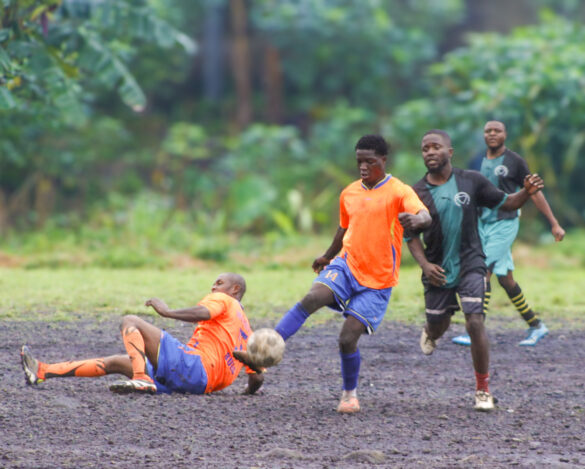In Cameroon’s English-speaking regions, where the echoes of gunfire have long replaced the sounds of laughter and community, a different kind of noise is beginning to rise—one that carries hope. It’s the shrill whistle of a referee, the rhythmic thud of a football, and the roar of resilient people, rediscovering joy.
For eight years, the Northwest and Southwest regions have been gripped by a brutal conflict between government forces and separatist fighters seeking an independent state called Ambazonia. Violence in the span of the conflict has claimed over 6,000 lives and displaced more than a million. Schools have closed, villages have burned, and the social fabric has frayed. But amid the wreckage, football is emerging as an unlikely balm.
The conflict widely known as the Anglophone Crisis has its roots in the historical marginalization of Cameroon’s English-speaking minority by the French-speaking majority government. What started as peaceful protests by lawyers and teachers in 2016 over the imposition of French language and law in their courts and schools escalated dramatically following a violent crackdown by government forces.
As the conflict has dragged on for nine whole years and counting, the embattled regions have been heavily militarised. Across militarised towns and separatist strongholds, grassroots tournaments are transforming dusty pitches into sanctuaries. For 90 minutes, fear is suspended and ragging gun battles momentarily stop. People shout, laugh, and argue—not about war, but about missed scoring chances and brilliant goals. In these moments, healing begins.
A Village Reclaims Its Soul
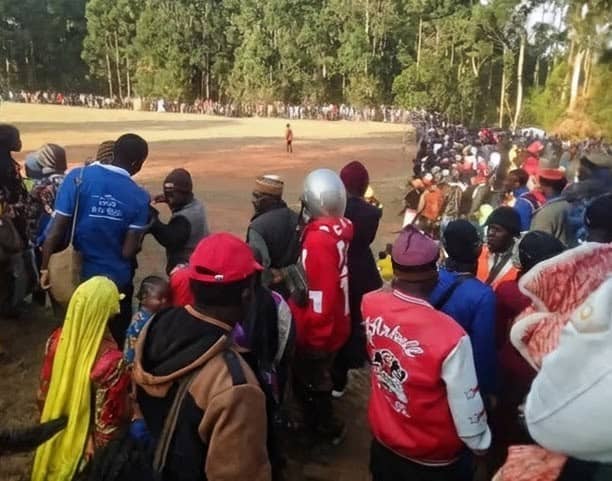
In Kuvlu, a village in the Northwest’s Bui Division, Mohammadu Salisu, a farmer and shopkeeper becomes a peace architect each November. Through the Kuvlu Elements Development Union (KEDU), locals at home and abroad fund a football tournament that has become the heartbeat of the community.
“We looked around four years ago and saw a community that had lost its soul,” Salisu says. “The crisis had taken our joy, our togetherness. We had to do something to take the minds of our people from the hardship and toll of war.”
The intercommunity tournament does more than entertain. It revives commerce, draws even the elderly out of isolation, and rekindles a sense of belonging. “You see people smiling, laughing, arguing about a missed chance, not about the war [crisis] again,” Salisu says. “Our minds now shift to focus on the game and the talents our young people still have.”
Crucially, the pitch is neutral ground. “We have a strict rule: no guns near the field,” Salisu explains. “Even the Amba boys—Separatist fighters—come to watch. Some of them are even players. In that moment, they are not fighters. They are just young men from our community.”
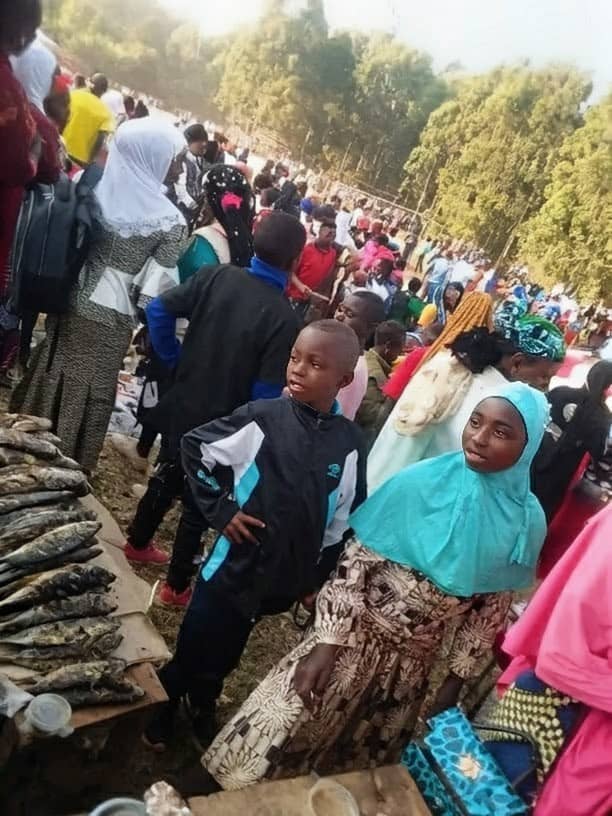
Referees as Peacemakers
But in a region scarred by violence, even football carries risk. A disputed call can ignite tensions. That’s where the referees step in—not just as officials, but as diplomats.
Mohamed Wiykinyuy, a construction worker, officiated the tense Finals of the 2024 Intercommunity Sports Tournament in Kuvlu between a local team and one from Tadu, rumoured to be loved by a separatist commander.
“The atmosphere was electric, but you could feel the underlying tension,” Mohamed recalls. “I flagged a decisive handball and an offside. It was the correct [right] decision, but not the popular one.”
Tempers flared. The organisers huddled. The verdict: the final would end without a winner. “It hurt to do it. The players were disappointed, the spectators were let down,” Mohamed admits. “But sometimes, preserving the peace means the game itself cannot have a traditional winner.”
His reputation has grown since then. “I’ve been receiving several calls from people who want me to return in time for the next tournament,” he says from Yaoundé, where he’s working. “The people trust my refereeing. I have to do it for the community.”
Like Mohamed, Tambe Brenda, a Guinness Super League referee and former team captain, understands the stakes too. “The security is not like that of the professional league,” she says. “If not careful you might not leave the same way you came.”
Her strategy is simple: fairness and communication. “I try as much as possible to be fair in every decision I take. By doing so I automatically calm the spectators.”
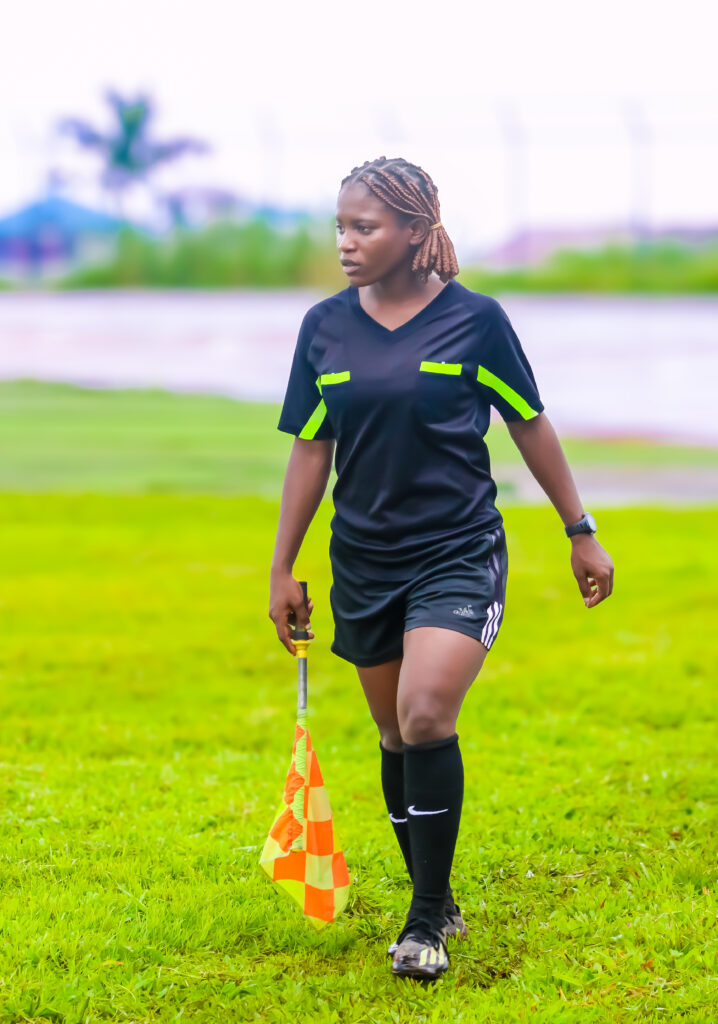
For Brenda, officiating is personal. In her home village of Nguti, she felt the power of giving back. “These games bring not just peace but life to the community,” she says. “Love, excitements… and unity.”
Ultimately, in these unlikely settings, the referee is a peacemaker. As Tambe Brenda puts it, her role is to use the laws of the game “with fairness to avoid conflict and maintain peace in the tournament,” proving that even in the most divided areas, the universal language of football, spoken with a just and honest whistle, can help bridge the deepest divides.
Trading Guns for Goals
In Muea, Tiko, and other towns once synonymous with gunfire, football is offering redemption. Ashu (not his real name), a former fighter, left the bush and joined the DDR Centre in Buea. Disillusioned by broken promises, he turned to football.
“I was in the bush for years,” Ashu says. “The anger, the frustration… it consumes you. But the sound of a football thumping, the roar of a crowd—it calls to a different part of [me] you.”
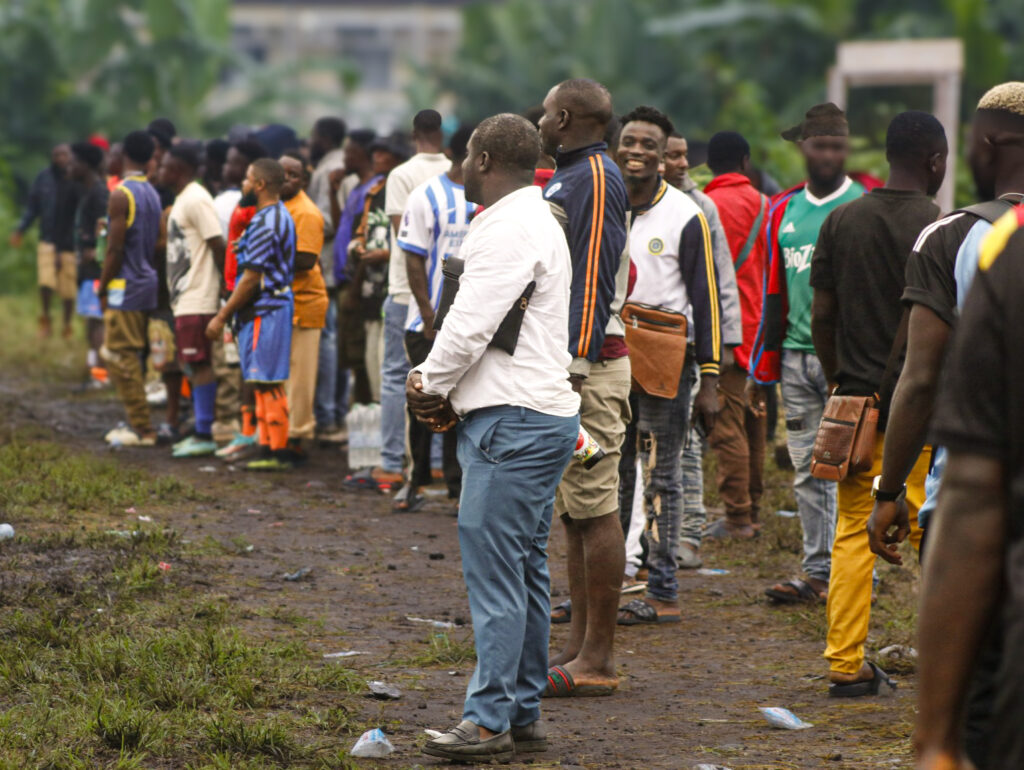
Now, he plays in communities across the Southwest, earning income and respect. “Playing football and entertaining spectators brings me a joy I never knew,” he says. “You realise you are part of the reason why the community comes alive again. No feeling beats that.”
A Fragile Peace, A Powerful Message
These tournaments are not a solution neither a quick fix to the Anglophone Crisis. The political grievances remain unresolved. Violence can erupt at any moment. But they [these tournaments] offer something rare: a glimpse of normalcy, a taste of unity.
“We are not solving the crisis,” Salisu says. “But we are saving our community, person by person, game by game. And for now, that is a victory worth celebrating.”
In the end, the most powerful peace efforts may not come from negotiation tables, but from muddy and dusty pitches where neighbours become teammates, and a whistle signals not war, but play. Let’s play on!
This work was produced as a result of a grant provided by the Cameroon Association of English-Speaking Journalists (CAMASEJ) as part of a project funded by Open Society Foundations.

